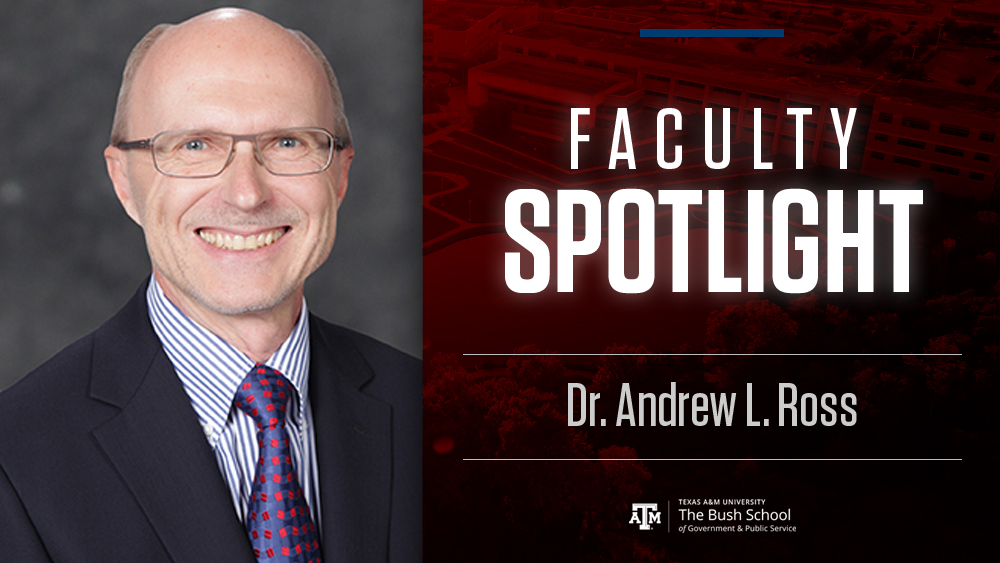
Andrew Ross, a professor in the Department of International Affairs, earned his MA and PhD at Cornell University and his BA, summa cum laude, at American University. Ross joined the Bush School faculty in August 2014 following a nine-year appointment at the University of New Mexico (UNM), where he served as a professor of political science; director of the Center for Science, Technology, and Policy; and director of Special Science, Engineering, and Policy Research Initiatives in the Office of the Vice President for Research.
Ross taught a course on national security and defense planning in the fall, and will lead a capstone on cyber security, deterrence, norms and governance in the spring.
“The capstone program was an especially attractive feature of the School’s curriculum,” Ross said. “I like the interdisciplinary approach the School takes toward public policy, and I’m a fan of applied work,” he added.
The capstone will assist the United States Cyber Command on a number of policy issues. Specifically, the project will explore cyber deterrence and normative issues surrounding cyber security.
“The field of cyber deterrence is a new frontier. It’s the next generation’s nuclear policy,” Ross said. “There are a number of policy questions that need to be answered, such as ‘How do you recognize a cyber attack?’ and ‘How do you know who attacked you?’”
Ross’s capstone assignment plays toward his academic and professional background. Prior to his appointment at UNM in 2005, Ross spent sixteen years at the US Naval War College, where he served as a research professor in the Strategic Research Department of the College’s Center for Naval Warfare Studies, acting director of the Advanced Research Program, co-lead of the post-9/11 Strategy Task Group, professor in the National Security Affairs Department, and Secretary of the Navy Senior Research Fellow. He received the Department of the Navy Meritorious Civilian Service Award in 2002.
In addition to his academic appointment, Ross is also a Senior Fellow at the Institute for Science, Technology, and Public Policy (ISTPP), a nonpartisan, interdisciplinary public policy institute based at the Bush School. The Institute examines how policies are crafted to address critical issues brought about by changes in science and technology.
“I’ve been working at the intersection of science, technology, and public policy my entire career,” Ross said. “So the Bush School and ISTPP are an excellent fit for me.”
Along with the capstone projects, Ross cites numerous other factors that attracted him to the School.
“A key motivation for me was getting the opportunity to work with such great colleagues. The School definitely knows how to build a great program,” Ross said. “The Bush School isn’t that old, but we’ve quickly established a solid reputation in public affairs.”
In addition to working with high-caliber faculty members, Ross says he is regularly impressed by the quality of the students in his classes. He says he is thankful for the small class size because it gives him a better platform from which to engage students.
“The courses I teach are very hands-on. In fact, most of the classes taught at the School are seminar style,” Ross said. “I frequently run exercises. Recently, I split my class into two groups; and we held a debate on the militarization of space. It’s all about applying research findings to real-world problems and issues.”
The principal investigator and leader of several major federally funded research initiatives, Professor Ross’ work on US grand strategy, national security and defense planning, regional security, weapons proliferation, and security and economics has appeared in numerous journals and books. His current research is focused on three areas—US grand strategy, defense and military innovation, and nuclear policy and strategy. Ross plans to develop and teach a course on nuclear policy and strategy.
As far as the future of his time at the Bush School goes, Ross said he’s looking forward to further interactions with students, including helping them through their studies and helping them find jobs post-graduation. “I’m looking forward to doing more capstones and working with students in that capacity,” Ross said. “I have a number of contacts in the business—private, public, and labs—and that will hopefully present opportunities for future capstone projects as well as internship and job placement for students.”
